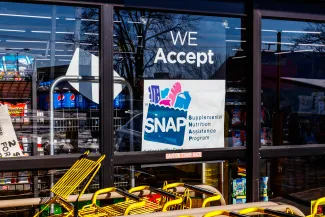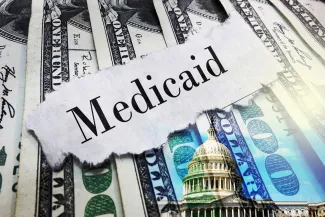
Colorado legislators react to SNAP, Medicaid reforms
© fotoguy22 - iStock - 1468912821
Colorado Democrats spent the weekend expressing their concern about the passage of the Big Beautiful Bill Act, which President Donald Trump signed on July 4.
Attorney General Phil Weiser, who is running for the state’s governorship in 2026, called it a “dark day” for the nation. He warned “painful fallout” lies ahead, especially for subsidy programs like Supplemental Nutrition Assistance Program or Medicaid.
“The radical cuts in the GOP budget bill will take healthcare away from over 200,000 Coloradans, put rural hospitals at risk, threaten jobs, raise utility bills, and take away vital food assistance,” Weiser said, also vowing to protect Colorado from Trump’s “attacks.”
SNAP
Currently SNAP provides food assistance to more than one in 10 low-income Coloradans. Under the act, a number of additional eligibility requirements will be put in place for those on SNAP. Those include work requirements for certain able-bodied individuals. States could also be required to pay for more of its administrative costs and benefit payments, upward of a 20 percent match for Colorado.

“Since its inception, SNAP benefits have been covered 100 percent by the federal government, with states only paying for benefits administration,” said a report from the Colorado Fiscal Institute. “But for the first time in history, the proposal would have states pay for a share of SNAP benefits.”
Monthly, approximately 617,000 Coloradans receive at least $120 million in SNAP benefits. In 2024, almost one million individual Coloradans received SNAP.
Democrats have said these “cuts” will put “American lives at risk.”
“It is stunning that the federal government is choosing to create a financial and humanitarian crisis that will only hurt our own residents,” said Denver Mayor Mike Johnston in a statement. “There is nothing more un-American on the Fourth of July than deliberately cutting benefits to the most vulnerable.”
Medicaid
The act also addresses subsidized healthcare programs.
Currently Medicaid programs provide health coverage to nearly 2 million Coloradans. Under the act, work requirements have been added for certain able-bodied individuals to be enrolled in taxpayer-funded Medicaid programs, as well as shifting some of the funding burden back to the states.

© zimmytws - iStock-2206705589
Colorado Democrats also decried this.
“Republicans’ reckless budget proposal doesn’t implement work requirements – it’s paperwork requirements that mean 140,000 Coloradans could lose access to the care they need,” said U.S. Representative Brittany Pettersen in a statement. “Not only that, it will cost our state $57 million a year and cut Medicaid by hundreds of billions of dollars over the next decade.”
U.S. Representative Jason Crow called it “heartbreaking and cruel.”
In contrast, Colorado Republicans applauded these reforms, while calling out Democrats.
“Republicans are fighting tooth and nail to make sure Medicaid dollars go to people who need it most: seniors, single moms, kids, and people with disabilities,” said U.S. Representative Gabe Evans. “We will keep looking out for our most vulnerable.”
Republicans have also called out Democrats, saying the reforms are necessary to prevent fraud and create more stable funding for welfare programs moving forward.
“Colorado Democrats are fear mongering and lying about the new Big Beautiful Bill — calling it apocalyptic,” said the Jefferson County Republican Party in a statement. “In truth, it cuts red tape, boosts energy, and puts Colorado's families FIRST.”
Moving Forward
These changes will take effect in December 2026, but Colorado is already preparing.
“The bill is anticipated to result in the large-scale loss of health insurance coverage for Coloradans and the extraordinary cost shift to our state that Colorado’s state budget cannot absorb,” said Kim Bimestefer, the executive director of Colorado’s Medicaid program in a statement regarding the act. “All efforts will focus on mitigating health care coverage loss and the challenging downstreaming results.”














